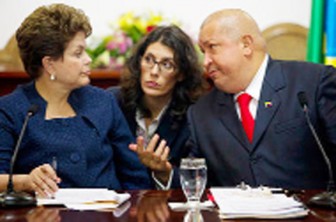CARACAS, (Reuters) – Showing off new energy after his recent cancer treatment, Venezuela’s President Hugo Chavez hosted Latin American leaders at a meeting yesterday to create a new regional body that pointedly excludes the United States.

The inauguration of the 33-member Community of Latin American and Caribbean States (CELAC), which also deliberately excludes Canada, was the Venezuelan socialist’s biggest moment on the world stage since he underwent surgery in June.
The 57-year-old Chavez, who wants to win re-election next October in the OPEC nation, warmly welcomed other leaders including Dilma Rousseff of Brazil, Argentina’s Cristina Fernandez and Cuba’s Raul Castro.
“As the years go by, CELAC is going to leave behind the old and worn-out OAS,” Chavez said, referring to the hemisphere-wide Organization of American States that leftist nations say is under Washington’s thumb.
The new group has lofty aims including the creation of a regional reserves fund for economic crises and a body for human rights monitoring. But critics say it unnecessarily adds yet another acronym to the plethora of overlapping, “alphabet soup” organizations that already exist around Latin America.
Exuding joy at the event, Chavez spoke at length and even made light of his health problems.
“Whose bald head is the most elegant? Lula’s or mine?” he joked of the chemotherapy treatment he and former Brazilian leader Luiz Inacio Lula da Silva have undergone.
Chavez also showed off the artistic skills he developed during his recuperation.
Argentina’s Fernandez shed a tear when Chavez presented her with a large painting he did depicting himself with her late husband. “It is the best picture I’ve ever painted,” he said.
“U.S. DISENGAGEMENT”
The countries of CELAC have nearly 600 million people and comprise the world’s number one food exporter. They have a combined GDP of about $6 trillion — roughly a third of the combined output of the United States and Canada.
Cuba, suspended from the OAS in 1962, is a CELAC member.
Analysts say the new body shows the wish of Latin America and the Caribbean to move out of the shadow of Washington.
“This has been aided by a progressive disengagement from the region by the U.S. since the end of the Cold War, allowing other countries — most notably China — to increase their footprint in primarily economic, but also political, terms,” said Robert Munks of global think tank IHS Janes.





